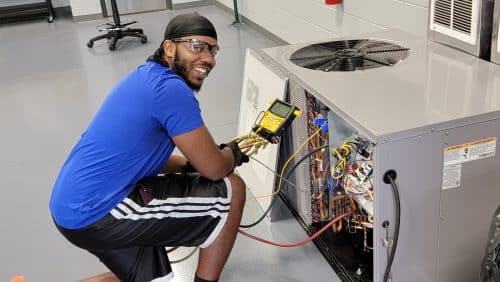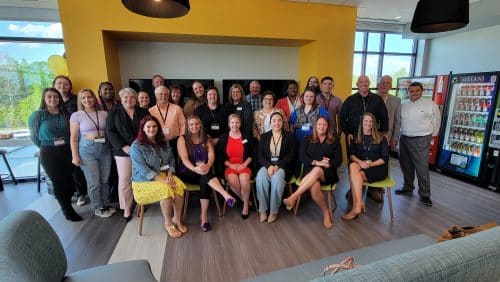
Leadership Academy
Leadership Academy
| 2024 | February | 28 | Wednesday | Coweta | 8:00 AM | 2:00 PM | Leadership | Conflict Resolution |
| 2024 | March | 6 | Wednesday | Troup | 8:00 AM | 12:00 PM | Leadership | Critical Thinking/Problem Solving |
| 2024 | March | 20 | Wednesday | Carroll | 8:00 AM | 12:00 PM | Leadership | Critical Thinking/Problem Solving |
| 2024 | March | 27 | Wednesday | Carroll | 8:00 AM | 12:00 PM | Leadership | Critical Thinking/Problem Solving |
| 2024 | April | 3 | Wednesday | Troup | 8:00 AM | 12:00 PM | Leadership | Team Work and Teambuilding |
| 2024 | April | 17 | Wednesday | Carroll | 8:00 AM | 12:00 PM | Leadership | Team Work and Teambuilding |
| 2024 | April | 24 | Wednesday | Coweta | 8:00 AM | 12:00 PM | Leadership | Team Work and Teambuilding |
| 2024 | May | 1 | Wednesday | Troup | 8:00 AM | 12:00 PM | Leadership | Time Management |
| 2024 | May | 15 | Wednesday | Carroll | 8:00 AM | 12:00 PM | Leadership | Time Management |
| 2024 | May | 22 | Wednesday | Coweta | 8:00 AM | 12:00 PM | Leadership | Time Management |
| 2024 | June | 5 | Tuesday | Troup | 8:00 AM | 12:00 PM | Leadership | Leadership and Influence |
| 2024 | June | 19 | Wednesday | Carroll | 8:00 AM | 12:00 PM | Leadership | Leadership and Influence |
| 2024 | June | 26 | Wednesday | Coweta | 8:00 AM | 12:00 PM | Leadership | Leadership and Influence |
Leadership Academy 2023-2024
October, 2023
Communication Strategies Workshop
For the better part of every day, we are communicating to and with others. Whether it's the speech you deliver in the boardroom, the level of attention you give your spouse when they are talking to you, or the look you give the cat, it all means something. The Communication Strategies workshop will help participants understand the different methods of communication and how to make the most of each of them. These strategies will provide a great benefit for any organization and its employees. They will trickle down throughout the organization and positively impact everyone involved.
November, 2023
Supervising Others
Supervising others can be a tough job. Between managing your own time and projects, helping your team members solve problems and complete tasks, and helping other supervisors, your day can fill up before you know it. The Supervising Others workshop will help supervisors become more efficient and proficient, with information on delegating, managing time, setting goals and expectations (for themselves and others), providing feedback, resolving conflict, and administering discipline.
December, 2023
Performance Management Workshop
Performance Management is making sure the employee and the organization are focused on the same priorities. It touches on the organization itself by improving production and reducing waste. It helps the employee or individual set and meet their goals and improves the employee manager relationship. The key in keeping an organization and employee aligned, which improves performance and productivity, is Performance Management. When changes occur, Performance Management helps the transition to be smoother and less hectic. It helps the organization and employee have a stream-lined relationship which improves communication and interactions between the two groups. It will help close any gaps that exist in an employee's skill-set and make them a more valuable employee through feedback and coaching.
January, 2023
Business Ethics
A company's ethics will determine its reputation. Good business ethics are essential for the long-term success of an organization. Implementing an ethical program will foster a successful company culture and do more than improve business, it will change lives. A company's ethics will have an influence on all levels of business. It will influence all who interact with the company including customers, employees, suppliers, competitors, etc. All of these groups will have an effect on the way a company's ethics are developed. It is a two-way street; the influence goes both ways, which makes understanding ethics a very important part of doing business today. Ethics are very important, as news can now spread faster and farther than ever before.
February, 2024
Conflict Resolution
Wherever two or more people come together, there is bound to be conflict. This course will give participants a seven-step conflict resolution process that they can use and modify to resolve conflict disputes of any size. Your participants will also be provided a set of skills in solution building and finding common ground. In the Conflict Resolution workshop, participants will learn crucial conflict management skills, including dealing with anger and using the Agreement Frame. Dealing with conflict is important for every organization no matter what the size. If it is left unchecked or not resolved it can lead to lost production, absences, attrition, and even law suits.
March, 2024
Critical Thinking and Problem Solving
We live in a knowledge-based society, and the more critical you think the better your knowledge will be. Critical Thinking provides you with the skills to analyze and evaluate information so that you are able to obtain the greatest amount of knowledge from it. It provides the best chance of making the correct decision, and minimizes damages if a mistake does occur.
Critical Thinking will lead to being a more rational and disciplined thinker. It will reduce your prejudice and bias which will provide you a better understanding of your environment. This workshop will provide you the skills to evaluate, identify, and distinguish between relevant and irrelevant information. It will lead you to be more productive in your career, and provide a great skill in your everyday life.
April, 2024
Teamwork & Team Building Workshop
For most of us, teamwork is a part of everyday life. Whether it's at home, in the community, or at work, we are often expected to be a functional part of a performing team. Having a strong team will benefit any organization and will lead to more successes than not. The Teamwork and Team Building workshop will encourage participants to explore the different aspects of a team, as well as ways that they can become a top-notch team performer. Your participants will be given the details and concepts of what makes up a team, and what factors into being a successful team and team member.
May, 2024
Time Management
Personal time management skills are essential for professional success in any workplace. Those able to successfully implement time management strategies are able to control their workload rather than spend each day in a frenzy of activity reaction to crisis aft crisis – stress declines and personal productivity soars! These highly effective individuals are able to focus on the tasks with the greatest impact to them and their organizations. This Time Management workshop will cover strategies to help participants learn these crucial strategies. Your participants will be given a skill set that include personal motivation, delegation skills, organization tools and crisis management.
June, 2024
Leadership and Influence
They say that leaders are born, not made. While it is true that some people are born leaders, some leaders are born in the midst of adversity. Often, simple people who have never had a leadership role will stand up and take the lead when a situation they care about requires it. A simple example is parenting. When a child arrives, many parents discover leadership abilities they never knew existed in order to guide and protect their offspring. Once you learn the techniques of true Leadership and Influence, you will be able to build the confidence it takes to take the lead. The more experience you have acting as a genuine leader, the easier it will be for you. It is never easy to take the lead, as you will need to make decisions and face challenges, but it can become natural and rewarding.






